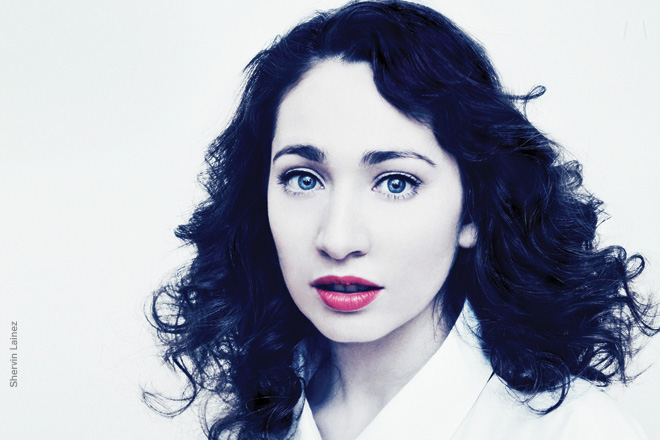REGINA SPEKTOR
This quirky Russian-American original lets her art speak for itself
Regina Spektor’s current world tour included two stops in Russia—the homeland she hasn’t visited since her family moved to the Bronx 23 years ago. “It feels incredibly big and emotional and overwhelming,” she said prior to the trip. “I’m also excited to see who will come to my show. Are there fans in Russia?” She needn’t have wondered. After six inventive albums, Spektor, 32, has won fans the world over. Produced by Mike Elizondo, her latest effort, What We Saw From the Cheap Seats, debuted at No. 3 on the Billboard 200. The eclectic, piano-centric songs range from whimsical to contemplative and feature Spektor’s signature vocal flourishes.
How do you pick the songs?
I have so many songs waiting to be recorded and produced properly, so it depends on what feels right in the moment. It’s a pretty haphazard, free-associative way of making records. I just write songs as I live life, and they accumulate. Sometimes there’s a song I’ve wanted to have on the record for years, but every time I try it’s not right. Sometimes really new ones sneak in, or ones I hadn’t even thought about. Or the producer comes up with a sound that I realize would be perfect for a song I haven’t thought about in so long—then all of a sudden that song ends up on the record, totally out of left field.
Why did you choose Mike to produce?
When I worked with the four producers [Elizondo, Jeff Lynne, David Kahne and Garret “Jacknife” Lee on Far, 2009], I loved it—it was fun having four shorter, more fleeting kinds of experiences. And then it was fun to go deeper with just one producer. I would do a full record with any of those people. Something great happens when you just come in and do a few songs, but something else great happens when you do a whole record.
How do you maintain your sound?
It’s all about collaboration and being really open. I’ve never worked with somebody who tried to impose anything on me, and if I ever did I’d probably be out of there in a few hours. The whole point of working with a producer is to help you flesh out your vision and express your songs. But I definitely love interacting with these wonderful musicians and having their ideas. Mike Elizondo is a virtuosic bassist, just amazing at upright and electric. He’s also an amazing programmer and finds beautiful sounds. There are so many things I wouldn’t be able to hear in my head without his help.
Your following has grown, what’s it like playing for a larger audience?
It’s really exciting—the idea that somebody is going to take that music and put it onto the backdrop of their life, like having the view out their window and hearing traffic along with the music that I made. Or walking with ear buds and hearing street sounds, or ocean sounds, or wherever they are, interacting with whatever song they’re listening to. That collective kind of experience is the exciting thing.
Do you feel fans should interpret your music a certain way?
As a matter of fact, no. It’s all about it being something personal for whoever is experiencing it. It’s meant to interact with their associations and their memories. That’s why I never talk about lyrics or explain anything, because to me it’s just a very boring way to go about bringing your art. The whole point is that people should have their own time with it. I love that.
–Heather Ebert




comment closed